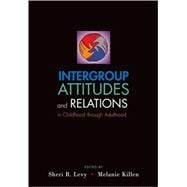
Note: Supplemental materials are not guaranteed with Rental or Used book purchases.
Purchase Benefits
What is included with this book?
| Intergroup attitudes and relations in childhood through adulthood : an introduction | p. 3 |
| The formation of intergroup attitudes and relationships | |
| Children's subjective identification with social groups | p. 19 |
| Peer group rejection and children's intergropu prejudice | p. 32 |
| The development of subjective group dynamics | p. 47 |
| Gender stereotyping and the prejudice in young children : a developmental intergroup perspective | p. 66 |
| The development of intergroup social cognition : early emergence, implicit nature, and sensitivity to group status | p. 87 |
| Social evaluation and reasoning about intergroup attitudes and relationships | |
| Intergroup attitudes and reasoning about social exclusion in majority and minority children in Spain | p. 105 |
| Explicit judgments and implicit bias : a developmental perspective | p. 126 |
| A social-development perspective on lay theories and intergroup relations | p. 146 |
| Multiculturalism and group evaluations among minority and majority groups | p. 157 |
| The multifaceted nature of sexual prejudice : how adolescents reason about sexual orientation and sexual prejudice | p. 173 |
| Fostering change in intergroup attitudes and relationships | |
| An integrative approach to changing children's intergroup attitudes | p. 191 |
| The common in-group identity model : applications to children and adults | p. 204 |
| A mutual acculturation model for understanding and undermining prejudice among adolescents | p. 220 |
| The role of intergroup contact in predicting children's interethnic attitudes : evidence from meta-analytic and field studies | p. 236 |
| Intergroup name-calling and conditions for creating assertive bystanders | p. 249 |
| Author index | p. 261 |
| Subject index | p. 271 |
| Table of Contents provided by Blackwell. All Rights Reserved. |
The New copy of this book will include any supplemental materials advertised. Please check the title of the book to determine if it should include any access cards, study guides, lab manuals, CDs, etc.
The Used, Rental and eBook copies of this book are not guaranteed to include any supplemental materials. Typically, only the book itself is included. This is true even if the title states it includes any access cards, study guides, lab manuals, CDs, etc.